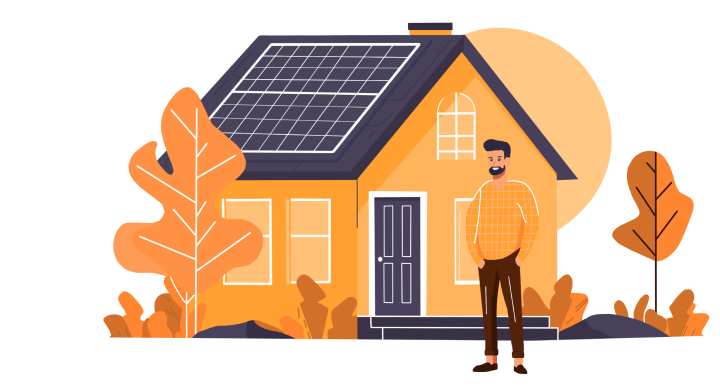Maximizing the efficiency of your residential solar panel installation can transform your home into a source of renewable energy, slashing electricity bills while reducing your carbon footprint.
To make the most out of your solar investment, it's essential to understand your home's solar potential, from evaluating roof space and shading to considering local climate conditions. Selecting the right panels for your energy needs and setting up a monitoring system for regular performance checks can further enhance efficiency and savings over time.
With Solar Energy Host, you can easily connect with local solar power installers and get competitive quotes, ensuring you make the ideal choice for your home and budget. Discover how to optimize your solar power installation and unlock the full benefits of harnessing the sun's power today.
Step #1: Assess your home's solar potential.
Evaluate roof space and angle for maximum solar efficiency.
Assessing the available roof space is crucial for determining how many rooftop solar panels can be installed. A clear, unobstructed area is ideal for maximizing energy capture.
Imagine your roof as prime real estate for sunlight. The amount of clear, continuous space available directly influences how many solar panels you can fit, which affects your overall energy production. A clutter-free, expansive roof allows you to harness the full potential of solar energy by fitting as many panels as possible.
Check for shading from trees or nearby buildings that could affect performance.
Shading from trees, buildings or other obstructions can dramatically reduce the efficiency of solar panels, as even partial shade can lead to significant drops in energy production.
Visualize sunlight dancing on and off your solar panels because of unavoidable shadows. Even a small shadow can drastically hinder the performance of your residential solar panel installation, reducing its electricity output. Identifying potential sources of shade is essential to avoid these energy losses in your home solar power system.
Step #2: Choose the right solar panels for your needs.
Evaluate solar energy cost vs. performance for different panel technologies.
Different solar panel types, such as monocrystalline and polycrystalline, offer varying efficiencies and costs, making it essential to weigh these factors against your budget and energy needs. Monocrystalline panels typically provide the highest efficiency but generally come at a higher price. Polycrystalline panels are cost-effective but slightly less efficient.
Understanding the long-term return on investment (ROI) is crucial; consider not only the initial home solar installation cost but also the expected solar energy savings and how long do solar panels last when making your decision. Evaluating the ROI helps you identify which panel type offers the best value over its operational lifetime, ensuring that your investment aligns with your financial and energy goals.
Get expert guidance on selecting the right option for your home.
Consulting with solar energy professionals can help you deal with the complexities of panel selection, ensuring that you choose options that align with your specific energy requirements and budget.
Residential solar panel installation experts can provide insights into the latest technologies, available incentives and warranties, which can significantly influence your overall satisfaction and performance of your home solar systems. They can simplify the technical jargon, breaking down complex information into actionable advice that simplifies your decision-making process.
Find local solar experts on Solar Energy Host.
Consulting with the expert solar installers you'll find through our platform can provide a comprehensive assessment of your home's solar potential, considering factors like roof orientation, shading and local conditions. They can also address questions you might have, like how to install solar panels at home and what solar energy benefits you can get from a residential solar panel installation.
The good news is that finding the right solar power company for your home is easy thanks to our platform.
Simply enter basic information, compare quotes and choose the best solar system installation offer for your needs. We are the go-to resource for those looking to reduce their electricity bills through solar power, and you'll soon discover why when you finally join the countless homeowners who have switched to a sustainable future with Solar Energy Host.
Step #3: Solar monitoring and maintenance are essential.
Install a solar monitoring system to track energy output in real time.
When you get a solar monitoring system during your residential solar panel installation process, you can get vital, real-time data on your energy production.
By keeping tabs on how much electricity your solar panels generate at any given moment, you can better understand their performance and make informed decisions about your energy use. This real-time data is crucial for identifying period-specific production trends, which can help you optimize your energy consumption throughout the day.
Regularly clean panels to avoid reducing efficiency.
Keeping your solar panels clean is crucial for maintaining their efficiency in producing sustainable energy.
Dirt, dust and debris can obstruct sunlight and dramatically reduce energy output, so regular cleaning ensures that your panels operate at peak performance. Even a thin layer of dust could lower your system's efficiency, which translates into less energy being generated for your home.
Use a soft-bristled broom to gently brush off any dust, dirt or debris from your panels. For panels on tilted roofs, rain can help with cleaning, but it's not always enough. For a flat roof solar installation, a hose can be used to rinse off the accumulated grime.
Frequently Asked Questions (FAQ)
Can I install solar panels if my roof is made of materials like metal or tile?
Yes, a residential solar panel installation can be done on a variety of roof materials, including metal and tile.
Metal roofs are particularly well-suited for solar installations due to their durability and ability to support the weight of the panels. For tile roofs, special mounting systems may be required to distribute the weight evenly and avoid damaging the tiles. Professional installers use specialized equipment and techniques to preserve the roof's structure and aesthetics, delivering a seamless look.
Do I need homeowners insurance for solar panels?
Some homeowners' insurance policies cover solar panels, but it's essential to check with your solar panel installation company to confirm coverage and any additional requirements.
Typically, providers provide product and power warranties. The product warranty covers the materials used in the solar energy system, ensuring their quality and durability. On the other hand, the power warranty helps ensure any natural degradation happens at a slow pace.
It's best to verify your homeowner's insurance details with your insurer for more personalized advice.
How do I find out if my state offers solar tax credits?
Many states offer residential solar panel tax credits or incentives for homeowners who get a residential solar panel installation but the specifics vary by location.
It's best to consult your state's official website or office for more details. You can also ask local, top rated solar installers for advice. These professionals are often well-versed in the latest incentives and can provide tailored advice based on your specific situation, so you can maximize the financial benefits available to you.
Take the first step to sustainable energy with Solar Energy Host
At Solar Energy Host, we are your gateway to transitioning to solar energy. Our straightforward and secure platform connects you with top local providers, ensuring you get the most competitive quotes for solar panel installation. All you have to do to get started with us is enter your details on our website and we'll make it easy for you to find local solar installers.
Get a free cost estimate now!



















